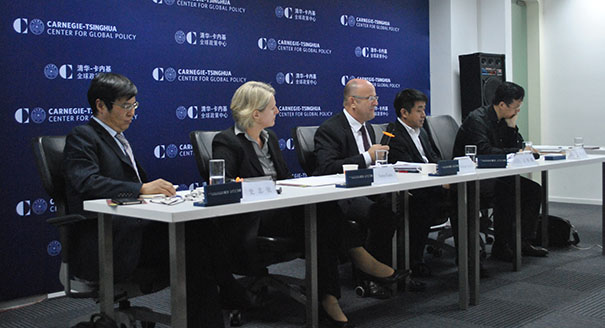Registration
You will receive an email confirming your registration.
The European Union is facing a number of challenges that could have long-term implications for the bloc’s relationships across the world, including the refugee crisis, a rise in populist political parties, and Brexit. Elections over the next year in Germany, the Netherlands, and France could further strain unity in the EU. China’s recently announced “golden era” of relations with the UK may also be at risk.
Carnegie–Tsinghua’s Shi Zhiqin moderated a discussion on how the broader China-EU relationship could be affected by turmoil in the EU. The conversation sought to shed light on what steps China may take to mitigate potential fallout from upcoming European elections.
Discussion Highlights
- Rise of Populism in Europe: The United Kingdom’s decision to leave the European Union over reasons of sovereignty and national interests reflects rising populism in the bloc, discussants said. However, one panelist argued Brexit is not going to create a domino effect of departures across the EU. Rather, the panelist said, it was an isolated case that should not be seen as a trend-setter. Discussants noted that while other countries may not leave the EU, the reason behind the UK’s departure are nonetheless being echoed in many European countries. As the panelist pointed out, European governments and politicians need to consider why populist movements are becoming increasingly popular and should be careful not to condemn them outright or label their supporters as uneducated. In this sense, they concluded, Brexit should serve as a crucial wakeup call.
- Lack of Strong Leadership: Right-wing populism arose out of a weakness in EU leadership and its inability to devise a strong immigration and refugee policy, one panelist argued. Instead, the panelist continued, the EU has been sending mixed signals to both their domestic constituency and the refugee population, resulting in the current anti-migration stance observed in many European countries and the UK. Compounding this issue, the absence of a strong central leadership has fragmented the bloc into clubs and sub-clubs of countries based on their geographic locations and ideological positions, another panelist noted, which further highlights the social inequalities within the EU.
- Need for a Common Vision: All of the panelists agreed there is a serious lack of a common vision within the EU. As one panelist explained, there needs to be a renewed emotional attachment to the idea that initially spurred the creation of the European Union. A significant portion of the European population today views the EU government based in Brussels as a bureaucratic machine that brings few benefits to other involved nations, one panelist warned. Additionally, the EU is undergoing what one panelist described as a legitimacy crisis that is heightened by the current rise of neoliberalism. Another panelist argued that this crisis jeopardizes the very foundation of the EU by destroying its liberal democratic bases and impeding social cohesion.
- Looking to the Future: In order for the EU to remain intact, one panelist recommended that it renew its commitment to bridging social inequality and present itself as a necessary tool in a globalizing world, defending not only its member states’ economic interests, but also symbolizing a liberal democratic ideal for emerging economies. The EU should reiterate its importance as a peaceful and unified bloc to reignite popular support within its member states, a panelist added. But panelists agreed that such a change necessitates a strong leadership that will shift the EU in a new direction by generating new policies, thereby regaining the popularity it has lost to populist and neoliberal movements over the past year. However, they added that a significant amount of uncertainty remains regarding Europe’s future, given the upcoming elections in Germany, the Netherlands, and France.
- China’s and a Post-Brexit EU: In light of these changes, panelists agreed that China and Europe cannot revert to ‘business as usual’ in a post-Brexit world. One panelist argued that Brexit has made China-EU relations more vulnerable, given the aura of uncertainty surrounding the bloc. However, the discussants said that China and the EU can still build a mutually-beneficial relationship, given that the EU remains a huge market with countless opportunities for China’s development objectives. The current situation suggests that the EU is in a weaker position than before, a panelist said. Today, China and the EU are on more or less equal footing, which could lead to strengthened communication and cooperation, the panelist added.
Shi Zhiqin
Shi Zhiqin is a resident scholar at the Carnegie–Tsinghua Center for Global Policy, where he runs the China-EU Relations program and the China-NATO dialogue series.
Anna Geis
Anna Geis is the co-director at the Institute of International Relations at the Helmut Schmidt University.
Michael Staack
Michael Staack is a professor and the co-director of the Institute of International Relations at Helmut Schmidt University.
Wang Zhanpeng
Wang Zhanpeng is a professor and the director of the Centre for Irish Studies at Beijing Foreign Studies University.
Xiong Wei
Xiong Wei is the vice chair of the Department of Diplomacy at China Foreign Affairs University.
